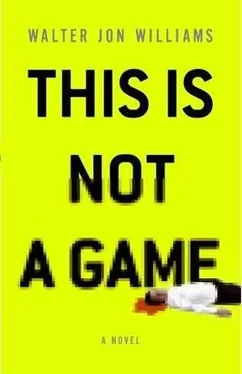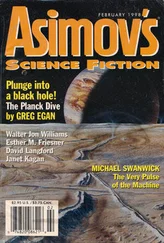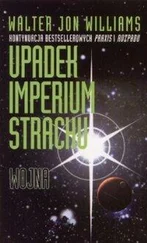“I just left a stupid, dead-end job in customer service,” he said. “I supplement my income with the two most despised activities in online RPGs: I’m a ninja and a gold farmer. All of the above is as repetitive as hell.” He thumped his fingers on the table. “So yes,” he said, “I’m bored.”
“Well,” Dagmar said, “I’ll try to keep things from turning too dull for the next few weeks.”
“I’d appreciate it.”
“But in the meantime I need to find out as much as I can about Charlie. So I need to find out what happened to AvN Soft.”
He glanced away, a rueful smile on his lips, then turned back to her and visibly steeled himself, squaring his shoulders, sitting more rigidly in his seat.
“Right,” he said. “We started by calling ourselves Advanced von Neumann Software, because our agents were meant to reproduce themselves. But that ended up being misleading, because von Neumann machines are self-replicating machines, not software, so we settled for AvN Soft. We started in this old building down in Culver City-it had been an old movie-production facility, and by that I mean old. There was junk in there dating from the forties. I wanted to put it on eBay and sell it to collectors, but Charlie insisted we didn’t have time, so we just paid the trash men to haul it away. And then we had to retrofit the whole building to modern standards-my God, there was no high-speed Internet anywhere in the building, let alone a T3 connection. And while that was going on, we found the asbestos in the ceiling. So that meant more delays and more money down the drain and guys in moon suits covering half the building in plastic sheeting.
“So then that’s the situation we were in when Soong Scientific went bankrupt. You remember them? ”
“No,” Dagmar said.
“They were bleeding-edge for, like, three years-but it turned out the bleeding edge was nothing but vapor, and when their CEO was arrested by the Chinese government for fraud and bribery and shot in the back of the head, his office tower in the valley became available. I talked Charlie into moving because we could buy the building cheap and it would save money in the long run. But that meant more discussion with the VC people, and more delay and more money…” He waved a hand. “Well. You can imagine.”
“I’ve heard Austin describe start-ups. This sounds sort of typical.”
“It felt like we were going off into the wilderness,” BJ said, “felling trees with hand tools, and putting up cabins. It felt like we were fighting bears with stone axes and eating them raw. It felt as if nobody had ever done any of this before. It felt like we had to invent everything from scratch.”
“Didn’t you have a business plan? ”
“Sure we did. But what did the business plan say about asbestos? What did it say about contractors that never showed up to do their work, about a project manager who found Jesus and ran away to a fundamentalist Bible camp in Arkansas, about old Soong servers that were riddled with Chinese trapdoors and had to be replaced-Christ, those Soong people were devious! The business plan didn’t last ten seconds. We were up the creek without a map.”
The waitress brought BJ’s coffee and dessert, but BJ’s story had gained momentum, and he ignored the food placed before him. He jabbed the air with a stubby finger.
“The fact was,” he said, “that Charlie and the development team were wandering in circles trying to get the product finished. I kept having to adjust the business strategy because the software kept mutating out from under me. And there were always choices to make-either do something half-assed now, or make a commitment to the long haul and do it right. I always made the choice that would pay off in the long run. I began by assuming the company would be there forever. The only times I compromised were when Charlie talked me into it-he was always looking over my shoulder and arguing with me instead of doing his own work.”
He spread his hands. “And I was right, wasn’t I? Charlie’s reaping the benefits of all my long-range planning. I’m just not there to share it with him.”
Dagmar nodded. “So how did it end? ”
“It was the first release that killed us,” BJ said. “Rialto was eight months late. There were bugs. The user interface sucked. What we had was a data-mining agent that would analyze publically available financial information-everything from stock market quotes to remittances to exchange rates to raw materials prices to employment rates-and it would make predictions. It would make the trades itself, if you wanted it that way.
“The problem was”-fervor shone in BJ’s eyes-“there was already plenty of software on the market that did that. The competition was fierce. Credit Suisse, for example, had an alg program that would analyze eight thousand stocks per second and trade based on predictions set three minutes ahead. Each trade took about a millisecond. They’ve probably got a better system now.
“And let’s face it, Release 1.0 just wasn’t all that successful in the beginning-Rialto was designed to evolve, not to be brilliant right from the start. It was hard to explain that to the customers. Word of mouth in the marketplace destroyed us.” He shrugged. “It’s very successful now, I understand.”
“That’s what I hear,” said Dagmar.
“After that,” BJ said, “the money ran out. We had five or six other projects in the pipeline, but it was too late. We kept having to lay off staff. I called every venture capitalist in America and every European merchant bank, trying to raise funds to keep us afloat. Eventually it was just Charlie and me and maybe half a dozen other people in this empty building. He was immersed in programming, trying to keep one of the other projects afloat-and whenever he saw me, he’d just start yelling that it was all my fault. He’d gone totally insane.
“Our options ran out. We declared bankruptcy, and all the assets were seized by our creditors. We’d pledged our copyrights and our own shares against our financing, so we were left with nothing. We stayed in our offices, because the building hadn’t been sold yet and our creditors hadn’t gotten around to throwing us out. And then”-he shrugged again-“Charlie’s backers turned up. They bought the company from the VC people for pennies on the dollar. They retained Charlie and threw me out.”
His blue eyes gave Dagmar a defiant look. “Russian Maffya?” he said. “You tell me.”
Dagmar was silent. BJ took a fork and jabbed it angrily into his shortcake.
“The least I could get out of all that,” he said from around his dessert, “is a damn meal.”
“Be my guest,” Dagmar murmured.
BJ ate his dessert in wrathful silence. Dagmar’s mind spun in circles, trying to reconcile BJ’s story of AvN Soft’s fall with those of Charlie and Austin.
In any case, the story seemed to cast very little light on Charlie’s current behavior.
The waitress arrived to ask if they wanted anything else. Dagmar looked over her shoulder and saw they were alone in the dining room. The loudest sound from the bar was a cable news channel. Dagmar said they’d have the check and then went to the ladies’.
Her route passed through the bar, and something, some dreadful sense of déjà vu, made her look at the news program perched on its plasma screen above the bar.
The crawl at the bottom of the screen read Bolivian Currency Collapse.
A shiver ran up her spine.
She remembered watching the same network talking heads five months before, from the bar in the Royal Jakarta.
“Apparently the same traders have now switched their focus to Chile,” one said. “Chile’s the IMF’s poster boy in South America, a perfect example of the neoliberal economic model…”
Читать дальше











